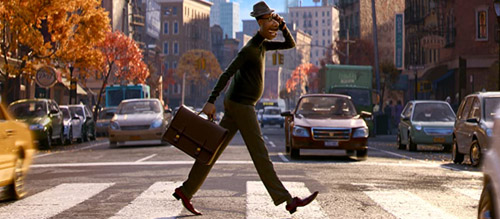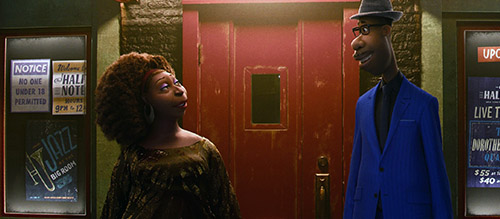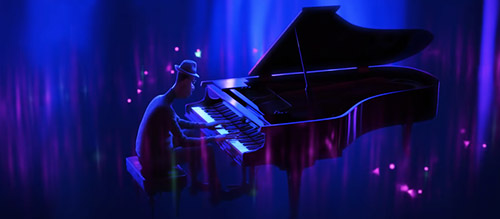You’ve Seen ‘Soul’. Now What?
Spoiler Warning: Please note that this article discusses the ending of Soul. Only continue reading if you’ve already seen the film.
For the past 25 years, Pixar Animation Studios has been widely celebrated for making films that explore large and often complex thematic ideas with a simplicity that is simultaneously designed to be accessible for children and incredibly moving for adults. It’s a masterful balancing act that is somewhat abandoned in Pixar’s latest feature. As the studio’s most challenging and philosophical film to date, Pete Docter’s Soul seems to care little about teaching a lesson to young children (or even appealing much to them), and instead seeks to teach a lesson to us adults.
We begin by meeting Joe Gardner, who serves as our vessel into the film’s existential journey. Initially, it may be unclear that Joe is in need of any sort of transformation. He is a passionate, well-meaning individual who seems to have a very clear dream and the determination necessary to achieve it. When Joe receives a phone call that may finally give him his big break, he is elated. Instead of teaching middle school band and gigging on weekends, playing with the renowned Dorothea Williams Jazz Quartet could be his ticket to a professional career as a jazz pianist. But once Joe is officially offered the gig, we start see to a very subtle shift in his behavior. His perspective narrows, and he becomes so distracted that he barely manages to avoid a number of near-death experiences before abruptly falling into an open manhole.
Suddenly, Joe is faced with the eternal nothingness of “The Great Beyond,” an idea characterized by a long conveyer belt rising up into a blinding white void. Once entered, unknown. Joe encounters dozens of other souls that either seem ready or indifferent to meeting their fate, but instead, Joe is filled with immediate anxiety about getting back to his life on earth. He believes he is capable of finding a way back and that he deserves his life. After a series of failed return-to-earth missions whilst in “The Great Before,” Joe decides to disguise himself as a “Mentor” and use his mentee’s “Earth Pass” for a well-designed escape plan. However, his mentee, known as 22, is strongly opposed to being sent down to earth. She is both pessimistic about being able to find her “Spark,” and cynical about what life on earth even has to offer. Joe on the other hand, is confident that his spark is playing piano. That’s his life’s purpose and it’s essential he gets back to it.
But what if Joe has been missing something? What if we are so focused on pursuing our “thing” that we are failing to listen to the world around us? How else could we expect to find inspiration as artists or human beings, or even experience real connection with another?
After a mix-up when falling down to earth, 22 lands in Joe’s body and Joe falls into the body of a therapy cat. Perhaps the most comedic device used in the film, the body-swap section also causes substantial growth for both characters. While Joe is desperate to resecure his gig at the jazz club, 22 finds herself in a Plato’s Cave opportunity of getting to experience life on earth firsthand, instead of merely through simulations during her thousands of years in The Great Before. While dangerous and overwhelming at first (like anyone’s first time in New York City), 22 soon finds wonder in the little things that earth has to offer. A slice of pizza, a conversation in a barber shop, a musician on a subway platform, and a fallen leaf all become tiny miracles. 22 is open to the world around her because unlike Joe, she is not jaded by a lifetime of unrealized dreams, disappointments, and regrets. Now with 22 in the driver’s seat, Joe is forced to observe how small changes in his behavior can open his perspective and strengthen existing relationships in his life, such as those with his barber, one of his students, and in a moment of bravery, his mother.
In a crucial moment in the film’s third act, we see Joe finally accomplish what we’ve been led to believe is his dream; he gets to play with the Dorothea Williams Jazz Quartet. Despite absolutely nailing the performance and being offered a permanent spot, Joe is met with a sobering disappointment. “I’ve been waiting on this day for… my entire life. I thought I’d feel different,” he tells Dorothea. Empathetic, she tells him a story about a fish: “He swims up to this older fish and says, ‘I’m trying to find this thing they call the ocean’ ‘The ocean?’ says the older fish. ‘That’s what you’re in right now.’ ‘This?’ says the young fish. ‘This is water. What I want is the ocean.’”
Joe travels back to his dark and empty apartment where he sits down at his piano, empties his pockets, and finds items that 22 has collected throughout the day. A pizza crust, a spool of thread, a lollipop, and a leaf all become reminders of life’s tiny miracles. Joe’s perspective now widens and he becomes curious about the world once more. When he returns to The Great Beyond to save 22 from becoming a “lost soul,” he is now able to remind 22 of those miracles, returning her spark. Doing something no other mentor has successfully done, Joe is given another chance to live his life.
The film shows us the epiphany Joe has, but once he returns to earth, we are never shown the tangible ways in which he implements the discoveries he has made into his everyday life. Similarly, we do not see what becomes of 22 once she reaches earth. It is up to each audience member to fill in those plot pieces on their own. By withholding this information, the film manages to more closely resemble the uncertainties of life itself. Like us, Joe can never really know what he will do with his life tomorrow. However, he now knows how he will live it. Joe has learned that he’s already in the ocean and it’s his choice whether or not he decides to see it that way. The film’s ending, a new day on Joe’s doorstep, reminds us that he must make this choice every single day. “I’m going to live every minute of it.”
Soul aspires to activate us to make similar discoveries for ourselves, so that we too will live every minute of life. In a bold stroke from a studio like Pixar, the film chooses to prioritize thematic vagueness over the ease and transparency of its plot, letting each viewer discover their own meaning. It’s clear the film wants us to stop seeing one’s “spark” and one’s “purpose” as synonymous. They define “spark” as that thing that inspires us the most, that gives us life. Whereas our “purpose” is how we try to live once we’re alive.
So, if our spark is not our purpose, then what is? Is it something we are assigned from birth, or something we can decide for ourselves? Just because we may have passions, they are not what define us; they don’t make up the entirety of our purpose. Therefore, maybe our passions aren’t our purpose, but our purpose is having passion. But should we even be trying to define our “purpose” in the first place? The film also makes a point to challenge our attempt at even understanding any of this: “You mentors and your passions. Your ‘purposes.’ Your ‘meanings of life.’ So basic.”
The way each person relates to their own idea of a soul has created vastly different responses to some of the questions posed by the film. For some, it’s difficult to identify a singular lesson that Soul tries to impart on us. For others, the film has had a very clear and profound resonance. I’ve been fascinated by the trust the filmmakers place in each of us to say for ourselves: “This is what I think the purpose of life is.” I was curious how other viewers might actually define that, so I decided to reach out to some people in my own life to see how they perceived the film’s final lesson. I asked each person to finish the phrase “Soul says the purpose of life is…” and the following are some of the responses I received:
“…to live and bask in the moment.”
“…to find joy and fulfillment in a variety of experiences.”
“… just to enjoy life.”
“…simply to exist and enjoy the time you were graced with, rather than wasting life searching for your purpose.”
“… to live life to the fullest!!!”
“… to live with unapologetic curiosity.”
“… to be compassionate and find passions that can help us create meaning and connection in the short time we have.”
“… to live every day knowing your passion is not your purpose.”
When I began thinking about Soul, I was under the belief that the ambiguity of the film’s ending left room for vastly different interpretations. However, I’ve come to understand that Soul ultimately brings all of us to versions of the same lesson in the specific way that each of us are most in need of learning it. Watching the film, our perspectives are widened and we are dared to be curious about the world again so that, like Joe, we can make our own unique adjustments in order to live every minute of life. Whether it’s “basking in the moment,” being “unapologetically curious,” or “knowing your passion is not your purpose,” we meet the film halfway and return with what is essential for our own unique souls in our own unique lives at this particular moment in time. From there, each of us must decide how we implement those discoveries in a tangible way. Like Joe, we are given another chance, and we too must choose to see the ocean every single day.
“I’ve always worried that maybe there’s something wrong with me. You know? Maybe I’m not good enough for living.” That’s a thought that may run through many of our minds during our darkest moments in life. Soul eases that anxiety with an offering of comfort: “Your spark isn’t your purpose. That part fills in when you’re ready to live.” Because our unborn souls found their spark, we are here. And no matter how elusive it may sometimes seem, that spark is still inside us. We are alive only because we were ready for life. We are meant to be here.
“Soul says the purpose of life is…”
Once you’ve answered that question for yourself, the hard part begins: Now what?
Recommended for you: Soul (2020) Review
Written by Peter Charney
You can support Peter Charney in the following places:
Twitter – @PCharnz
Instagram – @PCharnz
Website – petercharney.com




